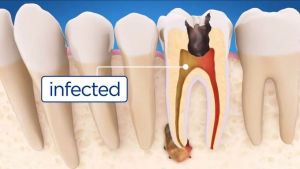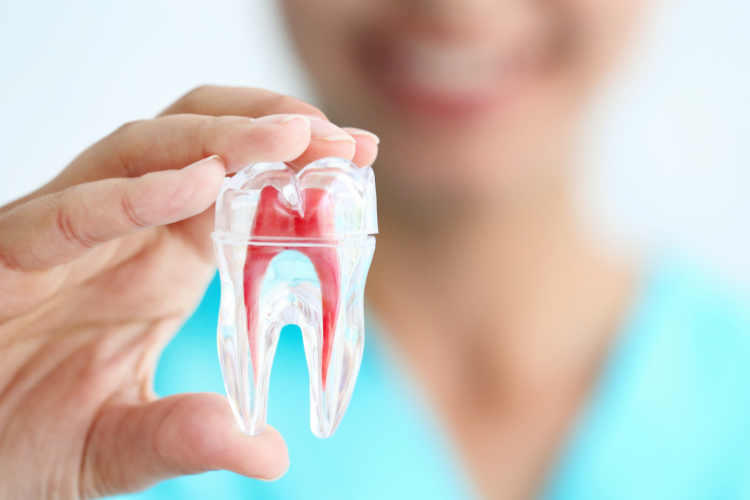Root Canal
What are some symptoms that indicate you may need root canal treatment?
Sometimes bacteria enters the pulp of a tooth and causes an infection. When this occurs, root canal therapy is necessary to save the tooth. During this procedure, the infected pulp is removed and the tooth is sealed to prevent reinfection.
In some cases, you may not know you have an infected tooth. However, many people notice certain symptoms. Signs you need a root canal include:
- Tooth pain that doesn’t go away: Many dental problems can cause tooth pain. If you have pain deep in your tooth, you may need root canal therapy. Discomfort may also radiate to your jaw, face or other teeth.
- Sensitivity to heat and cold: If your tooth hurts when you drink hot coffee or eat ice cream, it could mean that you need root canal treatment. This is especially true if the pain lingers for more than a few seconds.
- Swollen gums: When a tooth is infected, pus can collect in the area. This can lead to puffy, swollen or tender gums.
- Pimple on the gums: You may develop a pimple or boil on the gums. Pus from the infected tooth may drain from the pimple, causing an unpleasant taste or smell.
- Swollen jaw: Sometimes pus doesn’t drain from the site. As a result, your jaw may become visibly swollen.
- Tooth discoloration: When the pulp of a tooth becomes infected, it can cause your tooth to look darker. This occurs because of poor blood supply to the tooth.
- Pain when pressure is applied: If you have pain when you eat or touch your tooth, it could mean the nerves around the pulp are damaged.
- A chipped or cracked tooth: If you’ve cracked a tooth in an accident, when playing sports or even by biting down on something hard, bacteria can reach all the way into the tooth pulp.
- Loose tooth: An infected tooth may feel looser. This is because the pus from the infected pulp can soften the bone that supports the tooth.

Do root canals hurt?
Do root canals hurt?
Many people are afraid they’ll have tooth pain after root canal therapy. However, because the source of infection is removed during the procedure, most people find immediate relief following treatment. If you are experiencing throbbing pain after a root canal, call your healthcare provider right away.
Who should perform my root canal procedure?
Root canal treatment is completed by a general dentist or an endodontist (a root canal specialist). General dentists can often treat teeth near the front of the mouth since they have fewer roots. If you need root canal therapy on a tooth with multiple roots — or if your case is complex — then you may be referred to an endodontist.
What are the advantages of having a root canal procedure?
There are several benefits to choosing root canal therapy. This treatment can:
- Prevent infection from spreading to other teeth.
- Ease the symptoms associated with an infected tooth.
- Reduce the risk of jawbone damage.
- Eliminate the need for tooth extraction.
Are root canals safe?
Root canals are considered safe and effective. This procedure boasts impressive success rates of up to 98%.
What are common failed root canal symptoms?
Root canal complications can occur in some cases. This is especially true if your tooth is too damaged for this type of treatment. Failed root canal symptoms include:
- Pain.
- Swollen gums.
- Pus or drainage.
- Tooth discoloration.
- Pimple or boil on the gums.
- Sinus problems.
A note from Cinema Dental Care
Experiencing tooth pain or swelling in the jaw can be scary. Fortunately, root canal therapy can remove infection at its source so you can feel better quickly. If you suspect that you have an infected or abscessed tooth, call your healthcare provider right away. Prompt treatment can prevent infection from spreading and relieve your pain so you can get back to normal life. Dr. Kim will ensure that the new tooth looks and feels fantastic. If you would like to schedule an appointment with one of our Hygienists please contact us at Cinema Dental Care @ (661) 253-3030.

-
Permanent solution
-
Improved chewing and speaking
-
Natural function and look
-
Improved facial appearance
-
Prevention of bone loss
-
No special care required
-
Very sturdy and secure
-
No diet restrictions
-
Can be changed or updated

